#Curcumin Turmeric Extract
Explore tagged Tumblr posts
Text
The seven benefits of Turmeric for your skin: How to use
It is well known to us that turmeric has some properties that help to treat skin issues faster. Products like curcumin turmeric extract provide a lot of beneficial effects on our skin. Its benefits are always the most preferred from the earlier times, if it is for treatment of any wound or skin issues.
It has been the topmost choice for centuries due to its multipurpose benefits. If you are interested in getting the detail, then be with us till the end of the article to get the information regarding its benefits.
Benefits of curcumin turmeric extract
This natural essential has nutritious minerals, which help the skin with proper nourishment and even prevent the breakout of skin with multiple other benefits. Below mentioned are the topmost seven benefits for your skin.
Helps with glowing skin – The scientific name of turmeric is Curcuma Longa. Scientists have already proved that turmeric has some great skin-brightening properties. Its cleansing properties remove all the specks of dirt from the epidermal layer of the skin to make the skin bacteria-free. It has some beneficial properties which promote skin lightening by reducing the pigmentation of melanin from the layers of the skin.
Protects the skin from acne – Turmeric usually has some antibacterial and antifungal properties that fight the acne-causing bacteria from growing further and prevent them from causing more infections that lead to severe acne.
Helps with itchy skin – Itchiness in the skin is caused by the presence of certain bacteria over layers of skin. Turmeric and curcumin and their antibacterial properties are used to remove all the dirt particles from the different skin layers and create a bacterial-free environment that prevents itchy skin.
Helps with itchy skin – Itchiness in the skin is caused by the presence of certain bacteria over layers of skin. Turmeric and curcumin and their antibacterial properties are used to remove all the dirt particles from the different skin layers and create a bacterial-free environment that prevents itchy skin. Applying turmeric is used to absorb all the excess amount of oil from certain follicles and make the skin oil-free and perfectly moisturized by locking the moisture inside.
Treats dark patches in the skin – The brightening agents present in turmeric are used to reduce the effect of dark patches over the skin. It gets into the affected area and lightens the skin by removing the dead cells and reducing its pigmentation. Turmeric affects the collagen of the skin and regulates it accordingly to prevent issues like dark patches and dark circles.
Remove unwanted hair – Nowadays, the appearance of unwanted hair over the skin is considered the most unwanted thing. People used to go for several clinical methods for getting rid of this unwanted hair. Turmeric is used to weaken the roots of the hair by loosening its follicles. Regular application of turmeric over the skin is used to remove all unwanted hairs over the skin.
Different tips for using turmeric
There are several benefits of turmeric for the skin. Medicines give results when taken as prescribed. Similarly, turmeric will also give the best results when it will apply to the skin properly. The topmost tips for applying turmeric to your skin are mentioned below, this will give you the best results
As paste – The first and the most effective way by which you can apply it to your skin to get the utmost benefits. You can make a smooth paste by adding the required amount of turmeric and a few drops of rose water and then mixing glycerine with it. The next step is to give it a proper mix and then apply it over the skin with light hands. Keep it for almost 15 minutes then rinse it off.
As a mask – Applying it as a mask also gives the best results for glowing skin. Now the process might be different for different skin. But if you want the best results, you can use the required turmeric amount and add some aloe vera gel to it. After preparing the mask, clean your face with clear water and then apply. Leave it for more than 20 minutes and then remove it, you will notice an extraordinary glow over your face.
As scrub – The third most popular way of applying turmeric over your skin is simply by making a scrub. You can prepare a scrub with one tablespoon of turmeric, along with a tablespoon of aloe vera and some sugar in it. Take the prepared mix in your hand, and apply it over your entire face. Once it gets dried, lightly scrub it with your fingers to remove all the dirt. The use of turmeric can be beneficial in many ways, but most of the time of our busy schedules we don’t have that much time for preparing such remedies. This is the reason why we look for readymade but natural products. For such purposes, you can buy natural turmeric extracts from extroil naturals.
#turmeric extract#natural turmeric extract#turmeric extract powder#turmeric extract benefits#curcumin turmeric extract
0 notes
Text
Unlocking the Power of Natural Wellness with Natural Factors
In the quest for optimal health and wellness, choosing the right health products is crucial. The market is flooded with options, but few brands truly prioritize purity, quality, and sustainability. This is where Natural Factors shines as a leader in delivering high-quality vitamins, supplements, and holistic solutions that support your overall well-being.
Why Choose Natural Factors?
Natural Factors has built a legacy of trust and excellence by offering a range of organic ingredients-based products. Their commitment to sustainability and eco-conscious practices sets them apart in the industry. From sourcing raw materials to their manufacturing processes, they ensure that every step minimizes environmental impact while maximizing the health benefits of their products.
Whether you’re looking for immune boosters, joint health aids, or everyday wellness support, Natural Factors provides effective solutions tailored to meet diverse health needs. Their product range is crafted to enhance your quality of life while protecting the planet for future generations.
The Benefits of High-Quality Supplements
Taking vitamins and supplements is more than just a trend; it’s a proven way to fill nutritional gaps and maintain a balanced lifestyle. Natural Factors’ products are meticulously formulated to ensure you get the most out of every dose. For example, their Theracurmin line is a game-changer in the field of anti-inflammatory supplements, offering unparalleled absorption and potency to support joint health and reduce inflammation naturally.
Their range of immune support products is another standout feature. Designed to strengthen your body’s natural defenses, these supplements are made using clean, organic ingredients that you can trust. By prioritizing purity and efficacy, Natural Factors ensures their products deliver the results you need without unnecessary additives or chemicals.
Key Products to Enhance Your Wellness Journey
Theracurmin® Daily: As one of the most bioavailable forms of curcumin, Theracurmin delivers powerful anti-inflammatory and antioxidant benefits. It’s perfect for those dealing with chronic inflammation or seeking joint and overall health support.
Eco-Friendly Supplements: Natural Factors takes pride in offering eco-friendly supplements that not only improve your health but also care for the planet. These products are made with sustainability in mind, from packaging to production.
Immune Support Line: Strengthen your immunity with their specialized products designed to help you stay resilient against seasonal challenges. These supplements are packed with essential nutrients to keep your body’s defenses strong year-round.
Daily Vitamins: Natural Factors’ daily vitamins are tailored to suit different lifestyles and age groups. Whether you need a multivitamin for kids or a targeted formula for adults, their range ensures everyone gets the nutrients they need to thrive.
Embracing a Healthier Future
Choosing Natural Factors means investing in your health and the planet’s well-being. Their unwavering dedication to creating high-quality health products with organic ingredients makes them a go-to brand for individuals who care about what they put into their bodies. By aligning your wellness journey with a company that prioritizes sustainability, you’re making a positive impact on both your life and the environment.
Incorporate Natural Factors’ vitamins and supplements into your daily routine to experience the transformative power of natural wellness. From their innovative Theracurmin line to their broad spectrum of immune support products, there’s something for everyone in their range.
Start your journey to better health today with Natural Factors, and let their expertly crafted products guide you toward a healthier, more sustainable future.
#Theracurmin#Natural Factors#curcumin supplement#turmeric extract#joint health#inflammation support#wellness#vegan supplements#non-GMO#daily turmeric#bioavailable curcumin
0 notes
Text
Ambenatural's Ashwagandha Powder is a premium quality ayurvedic health supplement made with the purest form of organic ashwagandha root extract. Its natural properties help promote physical and mental wellbeing for all age groups. This scientifically-formulated powder is free from any added preservatives or chemicals and is naturally vegan, gluten-free, and Non-GMO. With its superior benefits, this ashwagandha powder is an excellent boost for overall energy, improved immunity, and emotional balance.
#ashwagandha root powder#best ashwagandha powder#ashwagandha extract#Tinospora cordifolia extracts#giloy ghanvati#giloy#tinospora cordifolia#cumin powder#cumin#black cumin#ground cumin#cumin spice#organic cinnamon powder#turmeric powder#curcumin extract#herbal extract#dong quai root#tulsi extract#gymnema sylvestre extract#herbal results olive leaf extract#turmeric curcumin with black pepper#dry fenugreek leaves#kasoori methi#kasuri methi leaves#fenugreek seeds#bay leaves
0 notes
Text
Supplements & Vitamins
Here's a list of some of the most commonly used supplements and their benefits. Please remember that while supplements can be beneficial for certain people, everyones nutritional needs are different. It's always a good idea to consult with a specialist before adding any new supplements to your routine, as individual needs may vary.
Multivitamin: Provides a range of essential vitamins and minerals to support overall health and fill potential nutrient gaps in your diet.
Omega-3 Fatty Acids: Promote heart health, brain function, and reduce inflammation. Typically derived from fish oil or algae.
Vitamin D: Supports bone health, immune function, and may have a positive impact on mood. It's commonly obtained through sun exposure, but supplements can be useful, especially in winter or for those with limited sun exposure.
Probiotics: Help promote a healthy gut microbiome, aiding digestion, nutrient absorption, and immune function.
Magnesium: Important for muscle and nerve function, bone health, and energy production. It may also help with relaxation and sleep.
B vitamins: Help convert food into energy, support brain function, and maintain healthy hair, skin, and nails.
Vitamin C: Boosts immune function, acts as an antioxidant, supports collagen production, and aids in iron absorption.
Zinc: Essential for immune function, wound healing, and cell division. It also supports normal growth and development during pregnancy, childhood, and adolescence.
Iron: Required for red blood cell production and oxygen transport. Iron deficiency can lead to anemia and fatigue, but it's essential to get iron levels checked before supplementing.
Calcium: Crucial for bone health and muscle function. It's often combined with vitamin D for better absorption.
Coenzyme Q10 (CoQ10): Plays a vital role in energy production within cells and acts as an antioxidant. It may benefit heart health and cellular energy metabolism.
Curcumin (Turmeric extract): Possesses anti-inflammatory and antioxidant properties, potentially supporting joint health and cognitive function.
Ashwagandha: An adaptogenic herb that may help reduce stress, promote relaxation, and support cognitive function.
Green Tea Extract: Contains antioxidants and may support cardiovascular health, weight management, and cognitive function.
Glucosamine: Commonly used for joint health and may help alleviate symptoms of osteoarthritis.
Chondroitin: Often taken alongside glucosamine, it may help reduce joint pain and improve joint mobility.
Probiotics for Gut Health: Certain strains of probiotics can help restore and maintain a healthy balance of gut bacteria, supporting digestion and immune function.
Melatonin: A hormone that regulates sleep-wake cycles, melatonin supplements can help with insomnia or jet lag.
Vitamin E: An antioxidant that supports immune function and may help protect against cellular damage.
Ginseng: An adaptogenic herb that may help increase energy, reduce stress, and support cognitive function.
Prebiotics: These are non-digestible fibers that promote the growth of beneficial gut bacteria, supporting gut health and digestion.
Magnesium: In addition to its previous benefits, magnesium may help reduce muscle cramps, improve mood, and promote relaxation.
Probiotics for Vaginal Health: Certain strains of probiotics can help maintain a healthy balance of vaginal flora, reducing the risk of infections.
Cranberry Extract: Often used for urinary tract health, cranberry extract may help prevent urinary tract infections.
Resveratrol: Found in grapes and berries, resveratrol has antioxidant properties and may support heart health and longevity.
L-theanine: An amino acid commonly found in green tea, L-theanine may promote relaxation, improve focus, and reduce anxiety.
#vitamins#supplements#health tips#healthy diet#health is wealth#healthy living#health and wellness#healthy lifestyle#health#clean girl#glow up tips#level up journey#wellness
3K notes
·
View notes
Text

Unlock the ancient secrets of vitality with our Voodoo Witch Doctor Turmeric Temptation Gummies, a mystical blend of turmeric, black pepper extract, and ginger. These potent gummies have been conjured to support your body's natural defenses against inflammation, boost joint health, and keep your skin glowing with an otherworldly radiance.
Channeling the healing wisdom of Voodoo tradition, these gummies transform turmeric’s golden essence into a delicious, easy-to-take ritual. With every bite, you'll feel the power of Curcumin, nature’s ancient remedy, as it flows through your body, promoting overall wellness. The added touch of black pepper enhances absorption, while the spicy ginger undertones tantalize your senses like a forbidden potion.
Supplementing with Turmeric Gummies is a great way to keep your joints, bones, and skin healthy.
☠️Use code "ASCEND" for 12% off your order!☠️ https://www.higherrealms.store/products/turmeric-temptation-gummies
#higher realms wellness#turmeric#voodoo#gummies#witch doctor#october#spooky#spooky season#health#health and wellness#subscribe and save#health and fitness#health and nutrition
2 notes
·
View notes
Text
IA Prep: Botany (Medicinal Botany)
Tulasi
Botanical name: Ocimum sanctum
Telugu name: Tulasi
English name: Holy basil
Sanskrit name: Vrinda
Family: Lamiaceae
Morphology: Erect, highly branched, softly pubescent aromatic sub shrub/annual herb.
Leaves range from elliptic to oblong, flowers white to purple, fruits are ellipsoidal nutlets - carcerulus.
Useful parts: The entire plant, especially the essential oil extracted from the leaves.
Chemical constituents: Eugenol (70%), Methyl eugenol (20%), Carvacrol (3%), Caryophylene (1%)
Uses:
- Antibacterial
- Insecticidal
- Diaphoretic (induces perspiration)
- Expectorant (clears lungs from excess mucus)
- Carminative (prevents formation or facilitates expulsion of gas)
- Treats Catarrh (excessive discharge of mucus in the nose and throat due to inflammation of the mucous membrane)
- Treats cough, cold, gastric disorders, etc.
- Treats snake bite and scorpion sting.
----------------------------------------------------------------
Turmeric
Botanical name: Curcuma longa
Telugu name: Pasupu
English name: Turmeric
Hindi name: Haldi
Sanskrit name: Haridra
Family: Zingiberaceae
Useful Part: Rhizome
- Primary rhizome: Oblong and ovate, often called bulbs or round turmeric.
- Secondary rhizome: Cylindrical long, branching, tapering at both ends. Commonly called fingers.
Used as raw material, subjected to further processing.
Has a characteristic pungent odor and bitter taste.
Chemical Constituents: Curcumin provides the distinct yellow color, three analogs have been detected so far: Curcumin I, Curcumin II, Curcumin III.
The volatile oil contains monoterpenes and sesquiterpenes like zingiberene, turmerone, borneol and cineol.
Uses:
- Antiseptic
- Astringent (tightening of soft body tissues)
- Carminative (prevents formation or expulsion of gas)
- Blood purification
- Treatment of Cough, Cold, Skin Diseases, Jaundice, and Menstrual Cramps.
Spice
--------------------------------------------------------------------
Ayurveda




--------------------------------------------------------------------
Homeopathy





--------------------------------------------------------------------
CIMAP



#exam season#send help#biology#notes#science#botany#plants#plant biology#plant science#medicine#medicinal plants#medicinal herbs#ayurveda#ayurvedic#homeopathy#tulsi plant#turmeric#please help#bad handwriting#holy basil
3 notes
·
View notes
Text
Home Remedies for Skin Sunspots: Secret Natural Solutions Revealed
Sunspots are flat brown patches that appear on parts of skin exposed to the sun over time. They are sometimes referred to as age spots or solar lentigines.
These are frequent places that many people find unpleasant from a cosmetic standpoint, especially as they become older.
At least there are a lot of DIY treatments that can help sunspots look less noticeable and balance out skin tone.

Home Remedies for Skin Sunspots
Understand Sunspots
Long exposure to ultraviolet (UV) radiation can cause sunspots, a frequent skin problem that is caused by an increase in melanin production in the skin.
The pigment called melanin, which gives our skin its color, can result in the formation of dark spots when it is produced in excess.
Sunspots usually develop on the face, hands, shoulders, and arms areas of the body that are exposed to the sun the most.
Natural Ingredients to Treat Sunspots
Sunspots can be effectively reduced without the use of harsh chemicals by using natural components.
The following are a few of the top natural remedies,
1. Lemon Juice
Lemon juice, which is high in vitamin C, gradually lightens sunspots by acting as a natural bleaching agent.
Lemon juice's citric acid helps exfoliate the skin by removing dead skin cells and encouraging the development of new, lighter skin.
2. Aloe Vera
Aloe vera is well-known for its healing and calming qualities, which may help in improving skin health and lightening sunspots.
Compounds found in aloe vera can help in promoting skin renewal and reduce pigmentation.
3. Apple Cider Vinegar
Because of its acetic acid content, apple cider vinegar is a well-liked treatment for skin tone evenness and sunspot removal.
Also having astringent qualities, apple cider vinegar helps to tighten and cleanse the skin.
4. Green Tea Extract
Antioxidants found in green tea extract can diminish sunspots and decrease the synthesis of melanin.
Green tea's anti-inflammatory qualities may also help in soothing and shielding the skin from more harm.

5. Turmeric
Curcumin, the main component of turmeric, has strong anti-inflammatory and skin-lightening effects.
Skin tone can be evened out and sunspots can be less noticeable with the use of turmeric.
6. Vitamin E
Strong antioxidant vitamin E can help heal damaged skin and lessen the visibility of sunspots.
It is a fantastic treatment for sun-damaged skin since it encourages skin regeneration and healing.
more >>>
2 notes
·
View notes
Text
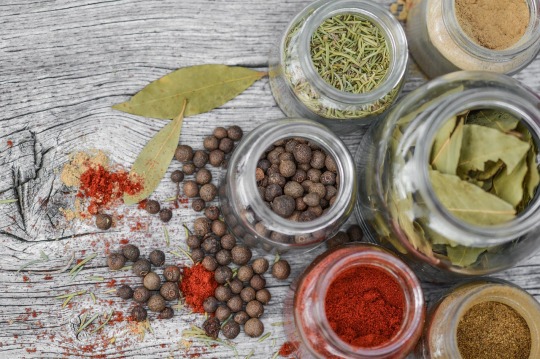
7 Herbs That Can Reduce High Blood Pressure:
Several herbs have been traditionally used for lowering high blood pressure. However, it's essential to consult with a healthcare professional before incorporating them into your routine, especially if you're already taking medication for hypertension. Here are some herbs and their potential effects:
1. Garlic: Garlic contains allicin, a compound believed to relax blood vessels and lower blood pressure. Some studies suggest that garlic supplementation may modestly reduce blood pressure levels.
2. Hawthorn: Hawthorn is known for its cardiovascular benefits. It may help dilate blood vessels, improve blood flow, and lower blood pressure. Research indicates that hawthorn extract may be beneficial for individuals with mild to moderate hypertension.
3. Basil: Basil is rich in eugenol, a compound that may help lower blood pressure by relaxing muscles around blood vessels. Some studies suggest that basil extract supplementation could contribute to blood pressure reduction.
4. Celery Seed: Celery seed contains compounds like phthalides, which may help relax the muscles in and around arterial walls, leading to lower blood pressure levels. However, more research is needed to confirm its effectiveness.
5. Cinnamon: Cinnamon contains compounds that may improve blood vessel dilation and reduce inflammation, potentially contributing to lower blood pressure. Some studies suggest that cinnamon supplementation may have a modest effect on blood pressure reduction.
6. Ginger: Ginger has been traditionally used to lower blood pressure. It contains compounds like gingerol, which may help relax blood vessels and improve blood circulation. However, more research is needed to establish its efficacy for hypertension.
7. Turmeric: Curcumin, the active compound in turmeric, has anti-inflammatory and antioxidant properties that may benefit heart health. Some studies suggest that turmeric supplementation could help lower blood pressure, but more research is needed to confirm its effects.
Remember that while these herbs may offer some benefits for blood pressure management, they are not a substitute for medical treatment. Always consult with a healthcare professional before starting any herbal regimen, especially if you have underlying health conditions or are taking medications.
3 notes
·
View notes
Text
NatureWise Curcumin Turmeric: A User's Review (After a Month of Use)
As someone who has been dealing with joint pain for a while, I was interested in exploring natural remedies for managing discomfort. After some research, I decided to try NatureWise Curcumin Turmeric with its high dose of curcumin and emphasis on improved absorption. Here's my experience after using it for a month:

High Potency with BioPerine Boost:
I opted for NatureWise Curcumin Turmeric because it delivers a powerful 2250mg of curcumin per serving. This is significant because regular curcumin has notoriously low bioavailability, meaning the body struggles to absorb it. The inclusion of BioPerine, a black pepper extract, is a big plus. Studies have shown BioPerine can significantly increase curcumin absorption, potentially maximizing the benefits.
Experience and Results:
I took the recommended dosage of three capsules daily with meals. The capsules are a manageable size and didn't cause any digestive issues for me. In terms of pain relief, I wouldn't say it's a miracle cure. There wasn't a dramatic difference overnight. However, after a few weeks of consistent use, I did notice a slight improvement in joint stiffness, particularly in the mornings. My knees felt a little more flexible, and overall, there were fewer aches throughout the day.
It's important to note that everyone's body reacts differently to supplements. While my experience included some positive changes, it might take longer for others to see results, or the effects might be more pronounced.
Additional Observations:
Organic and Vegan-Friendly: I appreciate that NatureWise uses organic ingredients and caters to those with dietary restrictions by being gluten-free, vegan, and non-GMO.
Dosage Considerations: While three capsules a day aren't excessive, some users might find it a high pill count.
Limited Clinical Claims: The product mentions supporting joint and cardiovascular health, but specific clinical references are lacking. It's always best to consult your doctor before using curcumin for any specific health condition.
Overall Impression:
Overall, I'm satisfied with my experience using NatureWise Curcumin Turmeric. The high curcumin content with BioPerine for better absorption is a strong selling point. While the pain relief wasn't dramatic, there was a noticeable improvement in joint stiffness, and I believe continued use might lead to even better results. If you're looking for a natural approach to managing joint discomfort and are willing to be patient, this could be a good option to explore. However, keep in mind individual experiences may vary, and discussing potential benefits with your doctor is always recommended.
Additional Notes:
It's important to maintain a healthy lifestyle alongside taking any supplement. This includes a balanced diet, regular exercise, and managing stress.
If you experience any side effects while using NatureWise Curcumin Turmeric, discontinue use and consult your doctor.
I hope this review provides valuable insights for those considering this supplement. Remember, your individual needs and experiences may differ.
health
#healthcare#hea;thy diet#health fitness#weight loss#joint health#pain relief#stiffness#joint stiffness
2 notes
·
View notes
Text
Incorporating Supplements Into Your Routine Will Maximize Your Health Benefits
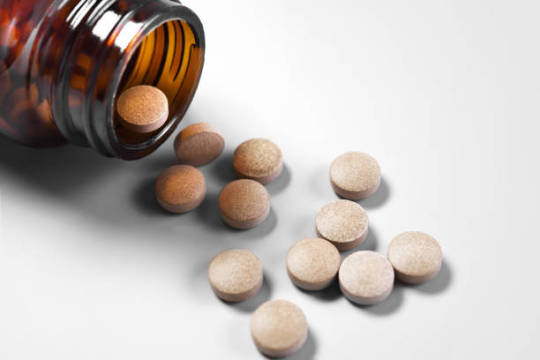
In order to maximize your health and well-being an appropriate diet, and regular workouts are vital. Even the most nutritious food choices may not be sufficient to provide your body with the nutrients it needs. This is where supplements can be helpful. In this post we'll explore the benefits of incorporating supplements into your daily regimen and ways to aid in maximizing your health.
Food Gaps to Fill
With a nutritious diet, it's hard to absorb all the nutrients your body needs to perform optimally. There are ways to fill in nutrition gaps with supplements. These will make sure that you receive all the nutrients, vitamins and minerals. essential nutrients.
For example, many people struggle to get enough omega-3 fatty acids that are essential to the health of your brain and heart. Supplements with fish oil can be the best way to make sure that you're getting sufficient amounts of these essential nutrients. Vitamin D can also be useful for those who do not receive enough exposure to sunlight. It is crucial to improve bone health and immunity.
Improved Athletic Performance
Supplements can be useful to fitness lovers and athletes who want to improve their endurance and recover. Creatine, as an example, is a popular supplement to increase muscle strength and bulk. BCAAs (branched-chain amino acids) can also lessen muscle soreness and aid recovery.
The nitric oxide and caffeine boosters could also help to improve the endurance and performance of exercise. It's essential to note that supplements are not a replacement for a healthy lifestyle and routine of exercise. In order to maximize the benefit of supplements, they must be taken in combination with a healthy diet and regular physical activity.
Supporting Brain Health
The support of brain health and function can be accomplished with supplements. Examples include omega-3 fatty acids and specifically DHA which are vital for healthy brain function and have been found to boost cognition and memory.
In addition, supplements like ginkgo biloba and phosphatidylserine can aid in improving cognitive performance and reduce symptoms of age-related cognitive decline. The supplements boost blood flow to brain cells, and enhance their overall health.
Lowering Irritation
youtube
Inflammation is a normal response in the face of infection or injury however, chronic inflammation may contribute to a variety of diseases, such as heart disease, diabetes, and autoimmune conditions. Vitamins like turmeric, ginger, and omega-3 fatty acids may help lower inflammation as well as promote general health and well-being.
For example, curcumin, the active ingredient found in turmeric, is a potent anti-inflammatory properties. It has also been demonstrated to lower inflammation within the body. Similarly, ginger has been shown to reduce inflammation and improve immune function. Omega-3 fatty acids, specifically EPA and DHA are also able to decrease inflammation and improve the health of your brain and heart.
Improving Resistant Objective
Supplements can be very helpful in boosting immunity and decreasing the chance of sickness and infections. Vitamin C, zinc and probiotics are excellent supplements to support immune function.
Supplements such as elderberry extract Echinacea, garlic and elderberry extract may aid in reducing the intensity and duration of colds, respiratory infections and other colds. The supplements boost immune function and help fight off infections.
Incorporating supplements into your daily life can help you achieve the healthiest you can be. Supplements are a great way to fill in nutrition gaps, boost the performance of athletes, boost the health of your brain, decrease inflammation, and enhance the immune system. It's crucial to remember that supplements should not be viewed as substitutes for a nutritious eating plan and workout routine.
8 notes
·
View notes
Text
#curcumin turmeric extract#curcumin extract#curcumin turmeric extract supplier from india#curcumin turmeric extract manufacturer
0 notes
Text

#Theracurmin#curcumin supplement#turmeric extract#anti-inflammatory support#joint health#antioxidant#natural health#daily wellness#immune support#Natural Factors
0 notes
Link
AmbeOrganic: AmbeOrganic is a line of organic herbal and nutraceutical products that are specifically designed to promote health and wellness. The products are made with a combination of natural herbal extracts, phytochemicals, and other nutrients that are believed to have a positive effect on the body. The company offers a range of products, including supplements, functional foods, and teas.
#ashwagandha root powder#best ashwagandha powder#ashwagandha extract#giloy ghanvati#mulethi powder#licorice powder#licorice root#cumin powder#cumin#organic cinnamon powder#cinnamon powder#turmeric powder#curcumin extract#herbal extract#dong quai root#tulsi extract#gymnema sylvestre extract
0 notes
Text
Chemistry behind Curcumin

Curcumin, the radiant golden gem extracted from turmeric's rhizome, has graced the culinary world as a natural pigment for ages. This vibrant compound belongs to the diarylheptanoid family, a group of phenolic pigments that bestow turmeric with its iconic yellow hue. This chemical marvel has long been a staple in traditional cuisine, adding a burst of color and flavor.
Beyond its culinary charm, curcumin has taken center stage in medical studies. Embracing its role as a health guardian, curcumin flaunts an impressive resume: a lipid-lowering virtuoso, an anti-tumor maestro, an inflammation pacifier, a gallbladder ally, and a guardian against oxidation.
Recent news highlights the plight of lead-tainted turmeric in Bangladesh, underscoring the importance of knowing our sources. As scientists and policymakers step in to confront this challenge, it becomes even more crucial to celebrate curcumin's untainted potential.
Read more: https://undark.org/2023/07/19/the-vice-of-spice-confronting-lead-tainted-turmeric/
2 notes
·
View notes
Text
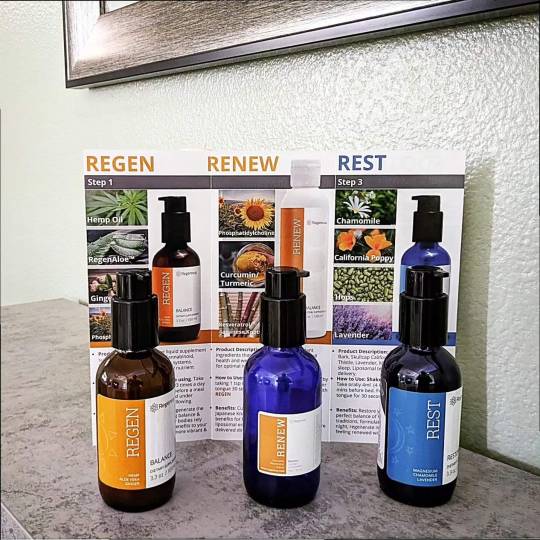
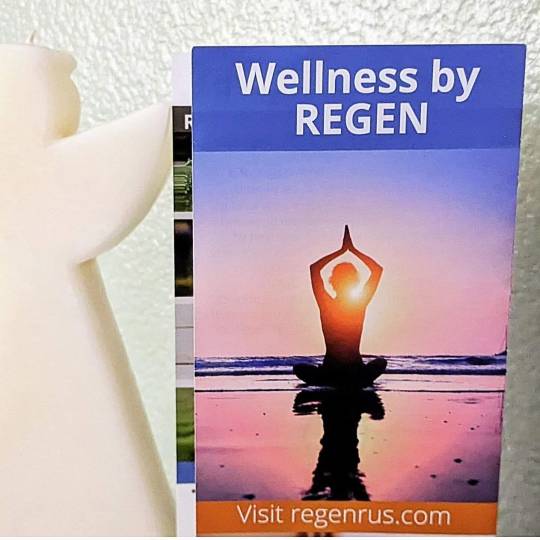
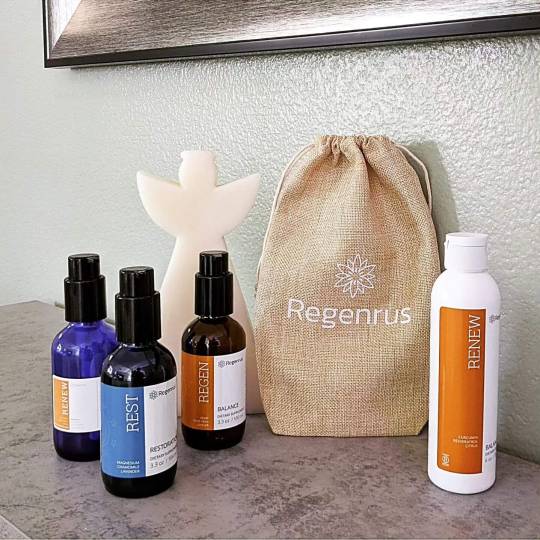
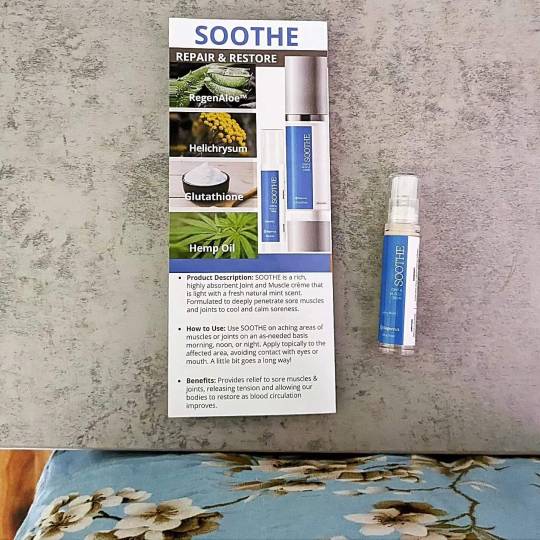

ad. 🌱 Did you know that liquid supplements are way easier for your body to absorb? This WELLNESS BUNDLE of REGEN, REST and RENEW liquid supplements from @regenrus
is everything I need for clean healthy energy through the day and sound sleep through the night. #Plantbased, ancient ingredients that actually work!
🌱 I take REGEN everyday as part of my #healthandwellness routine to support my nervous, immune, circulatory, and digestive systems. It's packed full of plant based ingredients I know and trust - #hemp oil, aloe vera, and ginger extracts! I take about 1 ml under my tongue 3x day before meals.
🌱 RENEW is another favorite of mine. It's a combo of three powerful ingredients! The curcumin #turmeric is a potent anti-inflammatory and antioxidant! The resveratrol is known for anti-aging benefits and lots more. Plus it contains
#phosphatidylcholine from Non-GMO Sunflower - known for improving memory, support metabolic health and more.
I take this powerful synergistic blend to improve my overall health. I take a little over a tsp mixed into about 1 oz. of juice.
🌱 I take the REST to help me naturally relax at night. I love how I wake up totally refreshed. It's a combo of all my favorite natural sleep remedies including #chamomile, #magnesium
#californiapoppy, lavender
milk thistle and more. I typically take about 4 ml under my tongue before bed.
🌱 I also got to try a sample of
SOOTHE Muscle & Joint Creme. I love how it relieves my low back pain so quickly. It feels light, non greasy and has a mint scent. It also contains some wonderful natural ingredients including organic aloe, full-spectrum hemp and other #naturalremedies.
🌱 To learn more about these clean ancient ingredients and get 10% of anything with my code: NurseShannan visit
https://www.regenrus.com
.
.
.
.
.
.
.
.
.
.
.
.
.
.
#liquidsupplements #liquidsupplement #naturalsolutions #naturalsupplements #naturalremedy #organizedmom #reviewer #reviewer #organization #getorganized #organizedhome #prodoctreviewer #momblogger #momlife #californiablogger #organizedmoms #organizedlife #organizedliving
2 notes
·
View notes
Text
Curcumin Extract Powder supplier
Unlocking the Potential of Curcumin: Why Choose Pharmabiz.world as Your Trusted Supplier
In the world of natural health and wellness, curcumin has emerged as a powerhouse ingredient. Extracted from turmeric, curcumin is renowned for its potent antioxidant and anti-inflammatory properties. It has become a cornerstone in dietary supplements, functional foods, and cosmetics. If you're in the market for premium curcumin extract powder, look no further than Pharmabiz.world—a trusted name in the global nutraceutical supply chain.
The Power of Curcumin

Curcumin, the active compound in turmeric, has been celebrated for centuries in Ayurvedic and traditional medicine. Modern science backs its efficacy in:
Reducing Inflammation: Curcumin helps alleviate chronic inflammation, making it a natural alternative for managing conditions like arthritis.
Boosting Antioxidant Levels: It neutralizes harmful free radicals while boosting the body’s own antioxidant capacity.
Supporting Heart Health: Studies suggest that curcumin can improve endothelial function and reduce risk factors for heart disease.
Enhancing Brain Function: Curcumin shows promise in supporting cognitive health and reducing the risk of neurodegenerative diseases.
Promoting Skin Health: Its anti-inflammatory and antimicrobial properties make it a popular ingredient in skincare formulations.
Why Choose Pharmabiz.world for Your Curcumin Needs?
Pharmabiz.world stands out as a reliable supplier for curcumin extract powder, offering unmatched quality and service. Here’s why we are the preferred choice for businesses across industries:
1. Premium Quality Assurance
Our curcumin extract powder is sourced from the finest turmeric roots and undergoes rigorous quality control processes. We ensure:
High curcumin concentration (95% or as required).
Purity and safety through advanced testing for contaminants.
Compliance with international quality standards.
2. Sustainability and Ethical Sourcing
At Pharmabiz.world, we prioritize sustainable practices. Our turmeric is ethically sourced from trusted farmers, ensuring a sustainable supply chain that benefits both the environment and local communities.
3. Competitive Pricing
We offer premium curcumin extract powder at competitive prices, making it accessible for businesses of all sizes. Bulk purchasing options and flexible terms ensure that our clients get the best value for their investment.
4. Global Distribution Network
With a robust distribution network, we cater to clients worldwide. Whether you're a supplement manufacturer in the United States, a cosmetics brand in Europe, or a health food company in Asia, Pharmabiz.world ensures timely delivery to your doorstep.
5. Tailored Solutions
Every business has unique needs, and we are here to meet them. Our team works closely with clients to provide customized curcumin formulations, packaging, and support.
Applications of Our Curcumin Extract Powder
Pharmabiz.world’s curcumin extract powder is versatile and suitable for a variety of applications, including:
Dietary Supplements: Capsules, tablets, and powders.
Functional Foods and Beverages: Curcumin-infused teas, smoothies, and snacks.
Cosmetics: Anti-aging creams, face masks, and serums.
Pharmaceuticals: Formulations for joint health and inflammation management.
Partner with Pharmabiz.world Today
When it comes to sourcing high-quality curcumin extract powder, Pharmabiz.world is your trusted partner. With a commitment to excellence, sustainability, and customer satisfaction, we help your business thrive in the competitive nutraceutical and wellness markets.
visit our website: https://pharmabiz.world/curcumin-extract | Email Us Your Requirements: [email protected] OR Call / WhatsApp Now for Order: 01169310523
Contact us today to learn more about our products, request samples, or place an order. Let’s unlock the incredible potential of curcumin together!
About Pharmabiz.world
Pharmabiz.world is a leading supplier of natural and nutraceutical ingredients, specializing in premium-quality products that meet the highest industry standards. With a focus on innovation, sustainability, and client success, we are dedicated to empowering businesses worldwide.
0 notes